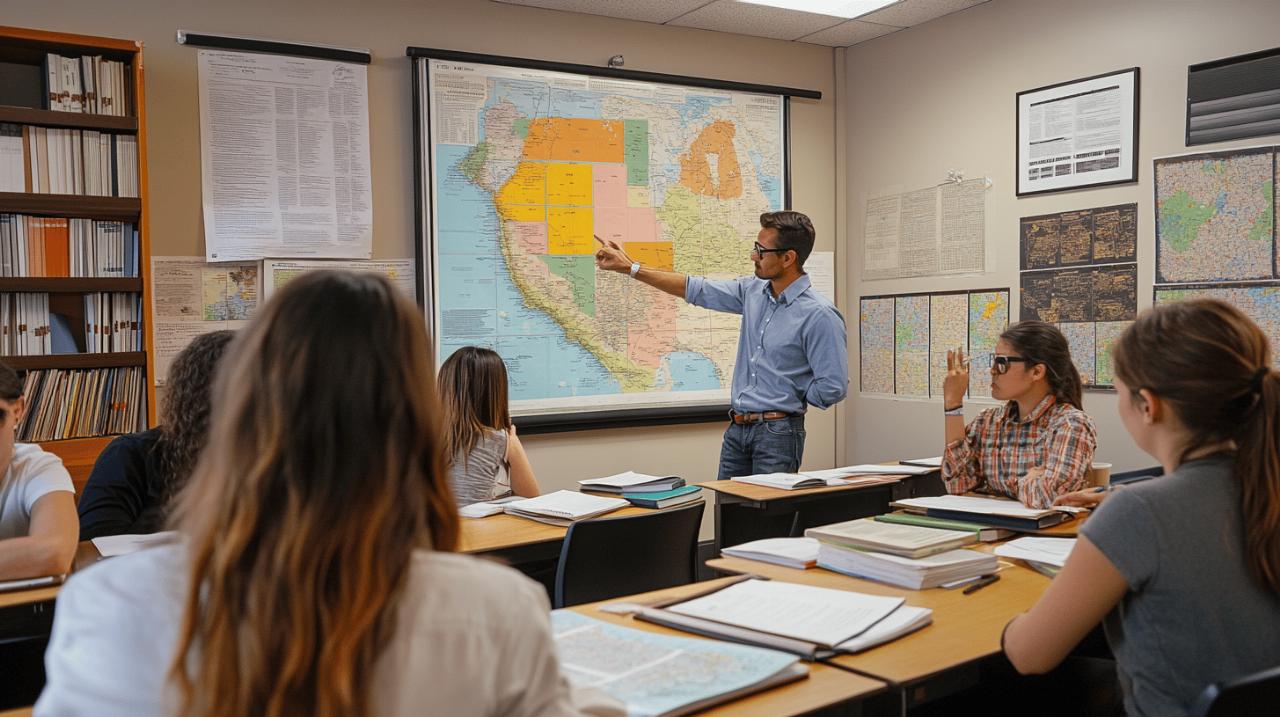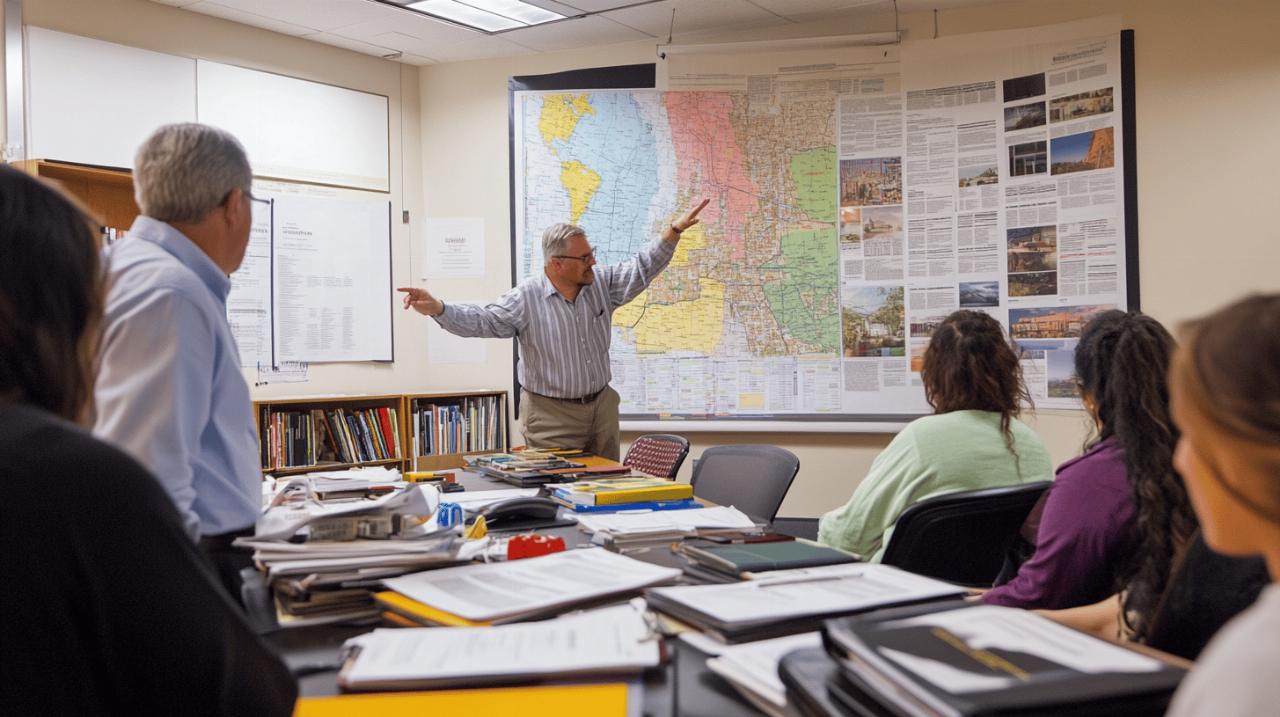Instructeur Droit des Sols Formation and Salary: Protecting Britain’s Historic Buildings Through French Planning Law Expertise
The world of planning law is often perceived as a niche discipline, yet it holds immense significance for those dedicated to preserving architectural heritage and guiding sustainable urban development. In France, the concept of droit des sols forms the backbone of land use regulation, encompassing everything from building permits to zoning decisions. As Britain grapples with its own challenges in heritage conservation and modern development pressures, understanding the training and professional pathways of instructors specialising in French planning law offers valuable insights. These educators not only prepare future professionals to navigate complex legal frameworks but also contribute to a broader international dialogue on how best to protect historic buildings and manage urban expansion.
Understanding the Role of a Droit des Sols Instructor in Modern Planning
Core Responsibilities and Daily Duties in Land Law Education
An instructor specialising in droit des sols occupies a pivotal position within the educational landscape, serving as the bridge between abstract legal theory and the practical realities of urban planning. Their primary responsibility lies in delivering comprehensive instruction on land law, covering topics such as planning permissions, building authorisations, and the regulatory frameworks governing land use. This involves preparing and delivering lectures that illuminate the intricacies of French legislation, ensuring that students grasp not only the letter of the law but also its application in real-world scenarios. Beyond the lecture hall, these instructors dedicate considerable time to developing and updating course materials, a task that demands constant vigilance given the frequent amendments to planning regulations. Assessment represents another crucial component of their role, encompassing the design of examinations, the evaluation of coursework, and the provision of constructive feedback to guide student development. Many instructors also engage in mentoring, offering one-to-one guidance to those grappling with particularly complex legal concepts or seeking advice on career pathways. The role extends into research and consultancy, with some instructors contributing to policy development or advising local authorities on contentious planning matters. This blend of teaching, research, and practical engagement ensures that instructors remain at the forefront of their field, continually enriching their pedagogical practice with fresh insights drawn from contemporary planning challenges.
The connection between french planning expertise and british heritage conservation
At first glance, the link between French land law instruction and the preservation of British historic buildings may seem tenuous, yet closer examination reveals a rich tapestry of shared concerns and transferable expertise. Both nations face the delicate task of balancing modern development needs against the imperative to safeguard architectural heritage. French planning law, with its robust regulatory framework and emphasis on community consultation, offers valuable lessons for British practitioners seeking innovative approaches to heritage management. Instructors versed in droit des sols bring a comparative perspective that can illuminate alternative strategies for protecting listed buildings, managing conservation areas, and integrating new development within historic contexts. This cross-channel dialogue has become increasingly important as European planning principles continue to influence British policy, even in the post-Brexit era. Professionals trained in French planning methodologies often find themselves uniquely positioned to advise on projects that span both jurisdictions or to introduce best practices from one system into the other. For instance, the French approach to heritage impact assessments and the rigorous standards applied to alterations in protected zones provide models that British conservationists can adapt to their own circumstances. By fostering expertise in droit des sols, instructors contribute not only to the education of French planning professionals but also to a broader international community committed to the thoughtful stewardship of historic environments. This transnational perspective enriches the curriculum and prepares students to engage with the global dimensions of heritage conservation and urban planning.
Essential Qualifications and Training Pathways for Droit des Sols Instructors
Academic requirements and specialist postgraduate studies
Embarking on a career as a droit des sols instructor necessitates a robust academic foundation, typically commencing with an undergraduate degree in law, urban planning, or a related discipline. However, entry-level qualifications alone rarely suffice for such a specialised teaching role. Aspiring instructors must pursue postgraduate studies, with a Master's degree in planning law or urban studies serving as the standard expectation. Many institutions prefer candidates who have undertaken a doctorate, as this level of study demonstrates both depth of knowledge and the capacity for independent research, qualities that enrich teaching and contribute to the intellectual life of the department. Specialist postgraduate programmes often include modules on land use regulation, environmental law, and heritage conservation, providing the comprehensive understanding required to teach droit des sols effectively. Coursework typically combines theoretical analysis with practical case studies, enabling students to appreciate how planning law operates in diverse contexts. Some programmes also incorporate comparative elements, examining how different jurisdictions approach land regulation, which proves invaluable for instructors who wish to offer a broader perspective to their students. Beyond formal qualifications, participation in workshops, seminars, and professional conferences further enhances an instructor's expertise, ensuring they remain conversant with the latest legislative developments and scholarly debates. This commitment to continuous learning is essential, given the dynamic nature of planning law and the need to equip students with current, relevant knowledge.
Gaining Practical Experience in Planning Authorities and Consultancies
While academic credentials form the bedrock of an instructor's qualifications, practical experience in the field is equally indispensable. Many aspiring instructors spend several years working within local planning authorities, where they gain first-hand insight into the administration of droit des sols. This experience provides an invaluable understanding of how planning applications are assessed, how disputes are resolved, and how legal frameworks translate into day-to-day decision-making. Working within a planning authority also offers exposure to the political and community dimensions of land use regulation, aspects that are often difficult to convey through academic study alone. Alternatively, some instructors build their expertise within private consultancies, advising developers, community groups, or heritage organisations on planning matters. This consultancy work hones the ability to communicate complex legal concepts to non-specialist audiences, a skill that proves immensely beneficial in the classroom. Time spent in practice also allows future instructors to develop a portfolio of case studies and real-world examples that can enliven their teaching and make abstract legal principles more tangible for students. Furthermore, professional experience fosters networks within the planning community, facilitating collaborations that can enhance both teaching and research. Whether gained in the public or private sector, this grounding in practical planning work ensures that instructors bring authenticity and relevance to their educational endeavours, bridging the gap between theory and practice in ways that textbooks alone cannot achieve.
Salary Expectations and Career Prospects for Land Law Instructors
Remuneration across different educational institutions
 The financial rewards associated with a career as a droit des sols instructor vary considerably depending on the type of institution and the level of experience. University positions, particularly those within prestigious research-intensive institutions, tend to offer higher salaries, reflecting both the academic credentials required and the dual expectations of teaching and research. In France, a lecturer at a public university might expect a starting salary that aligns with the national academic pay scales, which are determined by qualification level and years of service. As instructors progress through the ranks, from assistant lecturer to full professor, their remuneration increases accordingly, with senior positions commanding salaries that recognise the individual's contribution to scholarship and institutional reputation. By contrast, instructors working in smaller colleges, private training centres, or professional development programmes may receive more modest compensation, though these roles often offer greater flexibility and opportunities for part-time or freelance engagement. Remuneration packages may also include additional benefits such as pension contributions, research allowances, and sabbatical opportunities, all of which enhance the overall attractiveness of the role. Geographic location plays a part too, with positions in major cities like Paris typically offering higher salaries to offset the increased cost of living. Understanding these variations is crucial for anyone considering a career in this field, as it allows for informed decisions about career pathways and institutional affiliations.
The financial rewards associated with a career as a droit des sols instructor vary considerably depending on the type of institution and the level of experience. University positions, particularly those within prestigious research-intensive institutions, tend to offer higher salaries, reflecting both the academic credentials required and the dual expectations of teaching and research. In France, a lecturer at a public university might expect a starting salary that aligns with the national academic pay scales, which are determined by qualification level and years of service. As instructors progress through the ranks, from assistant lecturer to full professor, their remuneration increases accordingly, with senior positions commanding salaries that recognise the individual's contribution to scholarship and institutional reputation. By contrast, instructors working in smaller colleges, private training centres, or professional development programmes may receive more modest compensation, though these roles often offer greater flexibility and opportunities for part-time or freelance engagement. Remuneration packages may also include additional benefits such as pension contributions, research allowances, and sabbatical opportunities, all of which enhance the overall attractiveness of the role. Geographic location plays a part too, with positions in major cities like Paris typically offering higher salaries to offset the increased cost of living. Understanding these variations is crucial for anyone considering a career in this field, as it allows for informed decisions about career pathways and institutional affiliations.
Career progression and additional income opportunities through consultancy
Beyond the base salary, instructors specialising in droit des sols often find numerous avenues for professional advancement and supplementary income. Career progression within academia typically follows a well-defined trajectory, with opportunities to move from junior teaching positions to senior lectureships and eventually to full professorships. Each step up the ladder brings not only higher pay but also greater influence over curriculum development, research direction, and institutional governance. Many instructors enhance their income through consultancy work, leveraging their expertise to advise on contentious planning applications, heritage assessments, or policy development. Such consultancy engagements can be highly lucrative, particularly when instructors possess specialised knowledge of niche areas within planning law. Writing textbooks, contributing to legal commentaries, and delivering professional training courses represent additional revenue streams that also serve to raise an instructor's profile within the field. Conference speaking engagements and invited lectures further bolster both income and reputation, cementing the instructor's status as a recognised authority. For those with an entrepreneurial bent, establishing a consultancy firm or offering bespoke training programmes can transform teaching expertise into a thriving business. These diverse opportunities ensure that a career in droit des sols instruction is not only intellectually fulfilling but also financially rewarding, with the potential for a comfortable and varied professional life.
Staying Current with Legislative Changes and Professional Development
Keeping Abreast of Evolving French and European Planning Regulations
The landscape of planning law is in constant flux, shaped by new legislation, judicial rulings, and shifts in policy priorities. For instructors of droit des sols, maintaining currency with these changes is not merely advisable but essential to the integrity of their teaching. French planning regulations evolve in response to emerging challenges such as climate change, housing shortages, and heritage conservation pressures, requiring instructors to continually update their knowledge base. This demands regular engagement with official government publications, legal journals, and professional newsletters that track amendments to the law. Many instructors subscribe to specialist databases and attend annual conferences where leading practitioners and scholars discuss recent developments and their implications. European planning regulations also exert considerable influence, particularly in areas such as environmental impact assessment and heritage protection, necessitating a broader perspective that transcends national borders. Instructors must therefore cultivate an understanding of European directives and how they interact with French domestic law, a task that involves monitoring decisions from the European Court of Justice and staying informed about cross-border planning initiatives. This commitment to ongoing learning ensures that students receive instruction grounded in the most up-to-date legal frameworks, preparing them to navigate the complexities of contemporary planning practice with confidence and competence.
Research contributions and continuing professional education requirements
In addition to tracking legislative changes, instructors are expected to contribute to the scholarly discourse surrounding droit des sols through original research. This might involve publishing articles in peer-reviewed journals, authoring monographs, or participating in collaborative research projects that explore emerging issues in planning law. Such contributions not only advance the field but also enhance the instructor's credibility and teaching effectiveness, as research insights can be seamlessly integrated into the curriculum. Many institutions mandate participation in continuing professional education, requiring instructors to complete a certain number of training hours each year to maintain their accreditation. These requirements ensure that teaching staff remain proficient in pedagogical techniques as well as subject matter, fostering a culture of excellence and innovation. Professional development activities might include workshops on digital teaching tools, seminars on inclusive education practices, or courses on advanced legal research methodologies. Engaging with professional bodies such as planning law associations provides additional opportunities for networking, knowledge exchange, and career development. Through this multifaceted approach to professional growth, instructors sustain their expertise and enthusiasm, ensuring that they continue to inspire and educate the next generation of planning professionals with passion and authority.









